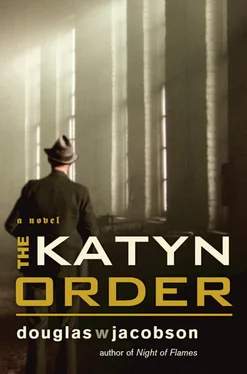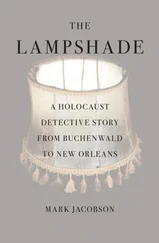Adam turned to Andreyev, who said, “General’s orders.”
Kovalenko’s final words of caution echoed in Adam’s mind. What the hell is going on?
“This isn’t the end of it,” Andreyev said.
10 JUNE
CAPTAIN ANDREYEV HESITATED at the top of the stairs, peering into the gloom of the shattered building, one of the few still standing in Berlin’s Mitte District. While the Mitte had always been the political and commercial center of Berlin, Andreyev found it hard to imagine this shattered section of the city would ever reach those heights again. The entryway of the building was littered with chunks of plaster and bits of broken glass, the window at the far end boarded up. An array of odors assaulted his nostrils—charred wood and masonry dust, human sweat, tobacco and stale beer.
An abrupt burst of light penetrated the murkiness as a door swung open at the bottom of the stairs and two figures emerged, laughing and stumbling. The larger of the two was a Red Army officer, who finally managed to grip the handrail on his third try and pulled an inebriated woman up the steps. The couple staggered past Andreyev and lurched through the outer door into the night.
Andreyev descended the staircase, following the din of laughter and drunken shouts, and peered through the smoky haze of the Rats Keller. A long, copper-topped bar was packed three-deep with sweat-soaked Red Army soldiers, all of whom looked as though they’d been there most of the day. Behind the bar, two beleaguered Germans hustled back-and-forth, shoving mugs of beer and glasses of schnapps into dozens of out-stretched hands.
In the center of the stifling room, a few couples swayed listlessly to the barely audible crooning of Frank Sinatra. Small, round tables covered with heavily stained red-and-white checkered tablecloths lined the perimeter of the room. While Andreyev enjoyed some American music, particularly jazz, Sinatra wasn’t his style and neither was this disgusting German beer hall. The less time he had to spend here, the better.
It didn’t take long for Andreyev to spot her, sitting alone at a table in the far corner. She had silky, black hair tied to one side with a pink ribbon and cascading over her bare left shoulder. The dress was yellow, slinky and low-cut, designed for business in the shadowy world of after-hours Berlin. She nodded when their eyes met, her fingers resting gently on the rim of an empty glass.
Andreyev snapped his fingers at a waiter—a boy of no more than sixteen—ordered two glasses of schnapps and slid into the chair across the table from her. “Fraulein Schmidt?” he asked quietly, though if he’d shouted no one would have heard him over the raucous clamor in the ancient drinking hall.
She eyed him curiously, then fished a package of Chesterfields from a black beaded purse, withdrew a cigarette and held it up, waiting for a light. “That depends on who wants to know.”
Andreyev took his time. She appeared to be in her late thirties, her voice was husky, her German refined and cultured, a native Berliner, he thought, upper-class, aristocratic… at least she used to be. Finally, he pulled a lighter from his shirt pocket and flicked it open. When she leaned forward to catch the flame, he took hold of her wrist, squeezing it just enough, communicating with his eyes don’t fuck around with me.
When he let go, the woman sat back and took a short, nervous puff, exhaling quickly.
The drinks appeared. Andreyev tossed the schnapps back in one gulp and pulled out his own pack of cigarettes. “Now, shall we talk?”
She took a tentative sip and set the glass on the table, her eyes darting around. “Here?”
“Ja, here. Or, if you’d prefer, we could take a ride.”
She twisted a large, ruby ring on her left middle finger. “What is it you want to know?”
“Dmitri Tarnov.”
“Schwein! A disgusting turd of a man.”
Andreyev smiled. “I need some information.”
She took another sip of the schnapps, then set the glass down. She stared at it, tapping long, painted fingernails on the table. “Ja, natürlich, but what’s in it for me?”
Andreyev reached over and put his hand over hers, to stop the tapping. “You could stay alive.”
From the window of the train, Dmitri Tarnov watched the peasants who trudged along the muddy roads and queued up at rail stations. Germans slogged westward while Poles, Ukrainians and Czechs headed eastward in the postwar confusion. He soon tired of the dreary scene and sat back in the seat of his first-class compartment. Perhaps most of them would starve along the way, he thought. It would save everyone a lot of trouble.
But Tarnov had more important matters on his mind. He wasn’t pleased about returning to Krakow. God knows he’d had enough of Poland over the last few years. But, thanks to Kovalenko, he had no choice. What the hell did that arrogant bastard think he was doing, sneaking an American diplomat into Sachsenhausen? It was a damn good thing Vygotsky had been there, or he might never have known. Tarnov felt a slight twinge of guilt as he thought about Vygotsky, but it passed quickly—just another casualty of war. As it turned out, the whole incident might actually have been a stroke of luck.
Tarnov had been frustrated for months after tearing apart Wawel Castle, searching for the one thing he knew would ruin him. But it wasn’t there. And it wasn’t among all the documents and diaries the lunatic Frank kept, because they’d been handed over to the Americans, and Tarnov knew that if they had found it, the entire world would know the secret… and he’d be rotting away in a Siberian gulag.
As the months passed, Tarnov had actually dared to believe it had gotten lost. Then, out of the blue, a Goddamn American diplomat representing the Polish Government had waltzed into Sachsenhausen and discovered that his uncle—a university professor from Krakow named Ludwik Banach—had been released into Hans Frank’s personal custody. Five years ago.
That had to mean something. Why would Hans Frank arrange for a Polish university professor to be released from a concentration camp into his personal custody? And what had Banach been doing all those years in Krakow? Did he have access to Frank’s personal papers? Had he seen the document? Did he have it?
The notion was crazy and so far-fetched it hardly seemed worth pursuing. On the other hand, it was the only lead he had.
Tarnov’s anger swelled the more he thought about it. Who the hell was Ludwik Banach? More important, where was Ludwik Banach—and what did he know? He stood up and headed for the officer’s dining car. He needed a drink.
11 JUNE
A LONG, BLACK MERCEDES pulled up in front of the King William Tower in the center of Berlin’s Grunewald District. As Adam approached, a British corporal jumped out of the vehicle. He muttered a quick, “Good evening, sir,” and opened the rear door.
“Looks like the British military is traveling in style these days,” Adam quipped as he got into the auto.
The corporal merely nodded.
Adam settled into the plush leather seat, wondering what was going on. He had received a message from Colonel Whitehall the previous day, inviting him to dinner. He hadn’t known the SOE leader was in Berlin. And the note was vintage Whitehall: terse and to the point, revealing nothing about the real agenda.
Adam recognized the Black Bull insignia of the British Eleventh Armored Division on the corporal’s sleeve. “You boys did a hell of a job at Normandy,” he said, trying to make conversation.
The British soldier glanced at him in the rearview mirror. “You’re a Yank? Were you there?”
Читать дальше












